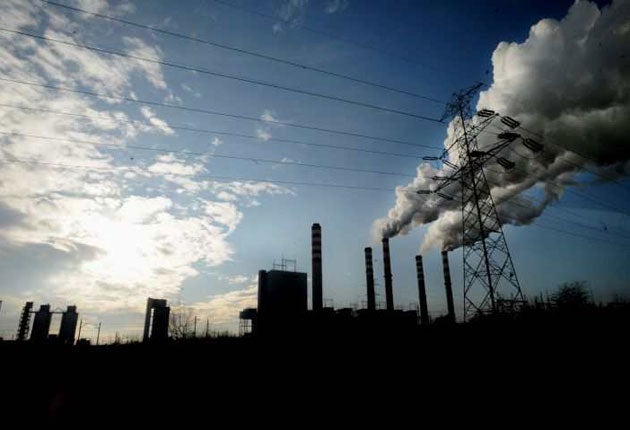EU accused of subsidising climate change after 'watered-down' deal
Emissions target agreed, but only after concessions granted to 'dirty' industries

Green groups accused the European Union of watering down its trail-blazing pledge to tackle climate change last night, after EU leaders made concessions to "dirty" industries in Germany and eastern Europe.
The compromise allowed the EU to agree on its commitment to cut emissions of greenhouse gases by 20 per cent by 2020. Its leaders said the deal, and the election of Barack Obama, will boost the prospects of a historic global agreement on climate change in talks in Copenhagen in a year's time.
Without a common EU front, the UN-led global negotiations would have collapsed. If there is an agreement in Copenhagen, the EU will raise its emissions cut target to 30 per cent.
A two-day EU summit scaled down its original plans, bowing to Germany, which wanted to protect its big manufacturing sector in the recession, and Poland and Hungary, which depend on coal. Donald Tusk, the Polish Prime Minister, greeted cameras with a victory sign as he left the meeting.
Instead of being required to buy 100 per cent of their "carbon emission permits" in 2020, as proposed by the European Commission, heavy industries including cement, chemicals and steel will have to buy only 70 per cent.
Robin Webster, Friends of the Earth's climate campaigner, said: "This could have been one of the EU's finest moments, but once again short-sighted national self-interest has been put ahead of the long-term safety of the planet. Huge loopholes allow big energy users to carry on polluting."
Joris Den Blanken, a spokesman for Greenpeace EU, added: "At the time that the US is finally re-engaging with the international community on climate, the EU's leadership is dropping away. Instead of acting to stop climate change, EU leaders are subsidising it."
Lower emissions from cars and renewable energy would be crucial, EU leaders said. Gordon Brown hailed the agreement as "ambitious", saying: "Europe and America acting together on climate change can persuade the rest of the world that we can reach a global agreement in Copenhagen next year. Europe's claim to be the leader on climate change will be not only upheld but advanced by what we agree today."
British officials said Mr Brown won a last-minute concession under which the EU will spend £9bn on carbon capture and storage, paving the way for "clean coal" plants if it works on a commercial basis. Britain hopes to win two of 12 demonstration projects. Britain also helped defeat attempts to delay power companies paying for 100 per cent of their carbon credits by auction from 2013 instead of getting them free.
Jose Manuel Barroso, the European Commission President, admitted that the concessions risked handing windfall profits to some of Europe's biggest polluters and that the original plans had been scaled down. "We would have preferred our initial proposals. But the suggestion that this is a watered-down ambition is nonsense, to put it mildly," he said. "We had to accept changes. That's the price to pay for unity in the end and it's a fair price."
Mr Barroso urged President-elect Obama to respond positively to the EU's move. "Our message to our global partners is: 'Yes, you can ... ' especially to our American partners," he said.
Climate deal: Key elements
*20 per cent cut in greenhouse gas emissions by 2020, compared with 1990 levels.
*20 per cent increase in use of renewable energy by 2020.
*20 per cent cut in energy consumption via improved efficiency by 2020.
*Allocation of "carbon permits" under EU emissions trading scheme to be cut by a fifth from 2005 levels.
*Power companies will have to buy their permits at auction from 2013.
*Auctioning for other industrial sectors and aviation phased in by 2020.
Subscribe to Independent Premium to bookmark this article
Want to bookmark your favourite articles and stories to read or reference later? Start your Independent Premium subscription today.

Join our commenting forum
Join thought-provoking conversations, follow other Independent readers and see their replies